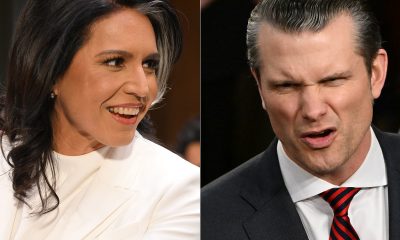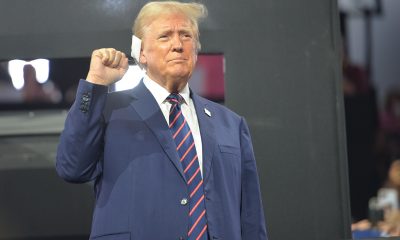Local
Clinton returns to D.C. lamenting mistakes of 2016 campaign
Dem nominee on role of misogyny, fake news in election loss
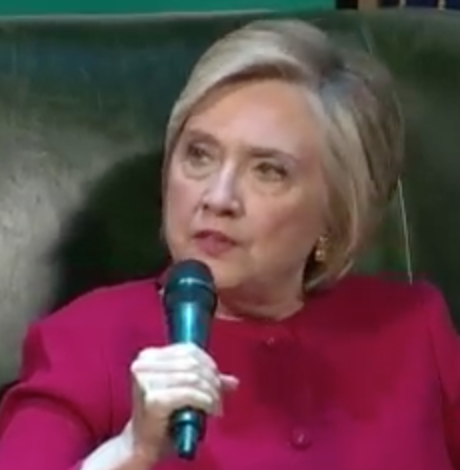
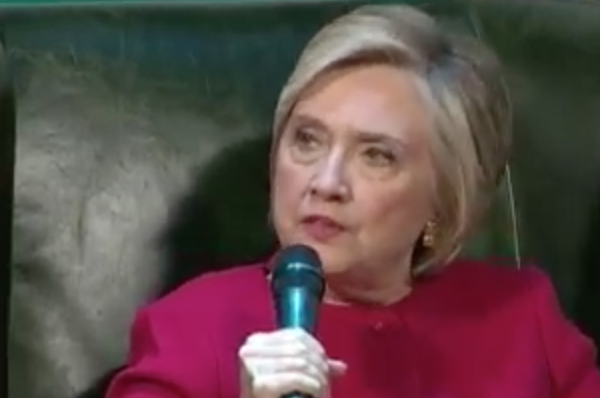
Hillary Clinton lamented having stayed “too focused on a path” in the 2016 election. (Screenshot via CSPAN)
As Hillary Clinton has reemerged in the national spotlight to promote her new book, some critics have groaned and wondered why she won’t just go away. They were not among the crowd at the Warner Theatre on Monday night.
In fact, the veneration for the first female U.S. presidential nominee of a major political party was palpable among attendees, who paid upwards of $82 for a ticket to the event.
The topic of discussion was her new book “What Happened” — a self-examination of the 2016 presidential campaign and actions that led to her loss and the election of President Trump to the White House — and Clinton had many explanations for that outcome and the way forward.
Clinton laid out a balanced approach to explain her loss, attributing the outcome not just to her missteps, but also outside forces that tipped the election in Trump’s favor.
“I just decided I was going to write it, and it was painful,” Clinton said. “I say in the book that I’d write about something, and I’d have to go lie down because it was just so hard to think about the mistakes I made and missed opportunities, but then also to come to grips with these other big forces at work that I think had a determinative impact on the outcome.”
Clinton recalled after the election before she started writing the book in February being “so devastated,” trying to feel better by cleaning out closets and taking walks in the park. The process of the writing the book, Clinton said, was “cathartic,” but also important for her view of democracy.
“It really hit me there were these very important issues that needed to be discussed, debated even, that our democracy and country relied upon that kind of self-examination,” Clinton said.
A key factor Clinton identified in her loss was not realizing the game had changed since her runs with her husband President Bill Clinton in the 1990s and her earlier campaign in 2008 — even during the 1960s and 1970s — when clear policy proposals were crucial for presidential candidates.
“You realize that the press is not putting out the policy that you’re putting out everyday, they’re covering an empty podium,” Clinton said. “And I kept thinking, ‘Well, we’re still going to break through because we really care do about what kind of jobs and infrastructure and health care and other things you want to do for them and their families and their incomes, but there’s a disconnect.”
Although Clinton said she “stayed too focused on a path” and “was not as adept” at changing to the new environment, she cautioned a less detailed approach might not be the path in the future and speculated “people will want details” again in 2020.
Lissa Muscatine, co-owner of Politics & Prose and Clinton’s chief speechwriter in the State Department and the White House, moderated the forum and queried Clinton on factors attributed to her loss, from Russian interference to fake news and misogyny.
Clinton recalled feeling compelled to exercise constraint as a woman and not respond during the second presidential debate when Trump could be seen on camera lurching close behind her as she spoke.
“As you might think back — funny gestures, facial expressions, heavy sighs — these really do affect viewers,” Clinton said. “And I just ended up believing that in addition to the gender-linked aspect of this, there was a history of people in presidential debates who had deviated in a way to show frustration, anger, dismissiveness, whatever their feelings were, and paid a heavy price for it, and I thought whatever price they paid, I would pay double or triple.”
Clinton recalled with indignation the Russians hacking the emails of her campaign chair John Podesta, which she described as being “stolen,” and given to Wikileaks — a website Clinton called “nothing more than a tool of Putin and the Kremlin.” Clinton said Trump’s associates “certainly” knew about it, citing a tweet from Roger Stone that Podesta’s time in a barrel would soon come.
Although Clinton said the emails were “anodyne,” she said they were later weaponized as fake news — in one case to potentially violent consequences as a result of the Pizzagate scandal in which Clinton was accused of running a child trafficking ring out of the basement of D.C. pizzeria. (The restaurant doesn’t even have a basement).
“Even I have to say I don’t believe it was meant to be believed to influence somebody to pick up an AR-15 and drive from North Carolina to Washington to liberate the imaginary children from the imaginary basement of the pizza parlor,” Clinton said. “But in came this young man believing that he was on a mission because he saw it on Facebook, he saw it in other places online, he saw it in quote, news outlets. And so, he was there on a mission of rescue. People could have gotten killed; he [fired] his automatic weapon inside this pizza parlor.”
Citing her loss to Trump by 53 percent among white women, Clinton said a major factor was former FBI Director James Comey reopening the email investigation — only for him to close it again one day before the election .
“All of sudden, people are told being told something’s going on, they’re going to investigate her again, or whatever,” Clinton said. “We could see that a lot of women in particular turned away. They were discouraged. I don’t blame them. They didn’t know what to believe. I mean, it was outrageous.”
When Muscatine mentioned Sen. Bernie Sanders (I-Vt.), whom Clinton heavily criticizes in her book for raising doubts about her connections to Wall Street, the audience at the Warner Theatre audibly booed and hissed.
But there were also moments of levity at the event. Muscatine at one point engaged Clinton in a game of having to choose one of a pair of words. Asked about “tea” or “coffee,” Clinton replied “coffee.” Asked about “beach” or “mountains,” Clinton replied “beach.” Asked about “Trump” or “Putin,” Clinton replied she’d have to “take that under advisement” because she “ran against both of them.”
Attendees at the event — who consisted mostly of middle-class women but also members of D.C.’s LGBT community — came to the Warner Theater adorned in Clinton campaign T-shirts leftover from the 2016 election. One vendor outside sold campaign buttons with slogans reading “Hillary 2016” and “Hil Yes!”
Blake Smith, 20, a gay student at George Washington University, worked for Clinton’s presidential campaign and came to the event wearing a T-shirt comprised of a collage of images of Clinton.
“I just think she gets a bad rap,” Smith said. “And I think that people treat her really unfairly, and I think that she’s really, genuinely a good person and she cares about this country.”
Virginia
DOJ seeks to join lawsuit against Loudoun County over trans student in locker room
Three male high school students suspended after complaining about classmate
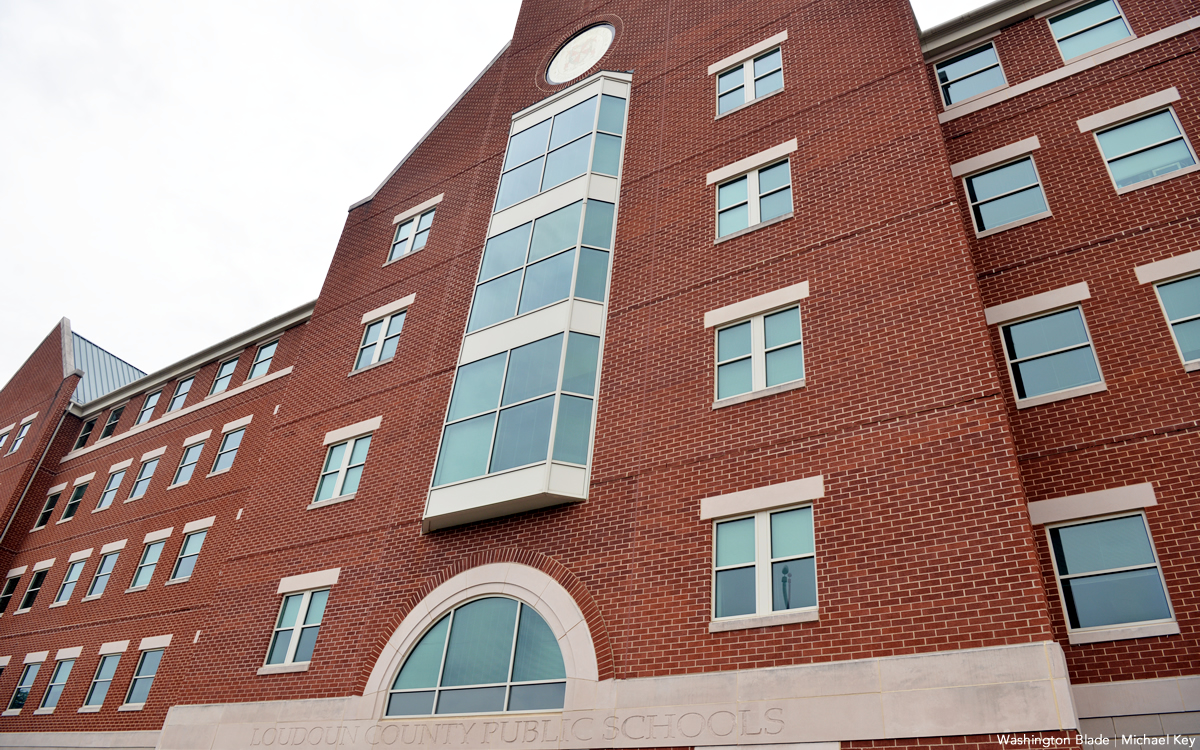
The Justice Department has asked to join a federal lawsuit against Loudoun County Public Schools over the way it handled the case of three male high school students who complained about a transgender student in a boys’ locker room.
The Washington Blade earlier this year reported Loudoun County public schools suspended the three boys and launched a Title IX investigation into whether they sexually harassed the student after they said they felt uncomfortable with their classmate in the locker room at Stone Bridge High School in Ashburn.
The parents of two of the boys filed a lawsuit against Loudoun County public schools in U.S. District Court for the Eastern District of Virginia in Alexandria. The Richmond-based Founding Freedoms Law Center and America First Legal, which White House deputy chief of staff Stephen Miller co-founded, represent them.
The Justice Department in a Dec. 8 press release announced that “it filed legal action against the Loudoun County (Va.) School Board (Loudoun County) for its denial of equal protection based on religion.”
“The suit alleges that Loudoun County applied Policy 8040, which requires students and faculty to accept and promote gender ideology, to two Christian, male students in violation of the Equal Protection Clause of the 14th Amendment to the U.S. Constitution,” reads the press release.
Assistant Attorney General Harmeet K. Dhillon of the Justice Department’s Civil Rights Division in the press release said “students do not shed their First Amendment rights at the schoolhouse gate.”
“Loudoun County’s decision to advance and promote gender ideology tramples on the rights of religious students who cannot embrace ideas that deny biological reality,” said Dhillon.
Outgoing Virginia Gov. Glenn Youngkin and outgoing Virginia Attorney General Jason Miyares in May announced an investigation into the case.
The Virginia Department of Education in 2023 announced the new guidelines for trans and nonbinary students for which Youngkin asked. Equality Virginia and other advocacy groups claim they, among other things, forcibly out trans and nonbinary students.
The U.S. Department of Education’s Office of Civil Rights in February launched an investigation into whether Loudoun County and four other Northern Virginia school districts’ policies in support of trans and nonbinary students violate Title IX and President Donald Trump’s executive order that prohibits federally funded educational institutions from promoting “gender ideology.”
District of Columbia
Capital Pride announces change in date for 2026 D.C. Pride parade and festival
Events related to U.S. 250th anniversary and Trump birthday cited as reasons for change

The Capital Pride Alliance, the D.C. based group that organizes the city’s annual LGBTQ Pride events, has announced it is changing the dates for the 2026 Capital Pride Parade and Festival from the second weekend in June to the third weekend.
“For over a decade, Capital Pride has taken place during the second weekend in June, but in 2026, we are shifting our dates in response to the city’s capacity due to major events and preparations for the 250th anniversary of the United States,” according to a Dec. 9 statement released by Capital Pride Alliance.
The statement says the parade will take place on Saturday, June 20, 2026, with the festival and related concert taking place on June 21.
“This change ensures our community can gather safely and without unnecessary barriers,” the statement says. “By moving the celebration, we are protecting our space and preserving Pride as a powerful act of visibility, solidarity, and resistance,” it says.
Ryan Bos, the Capital Pride Alliance CEO and President, told the Washington Blade the change in dates came after the group conferred with D.C. government officials regarding plans for a number of events in the city on the second weekend in June. Among them, he noted, is a planned White House celebration of President Donald Trump’s 80th birthday and other events related to the U.S. 250th anniversary, which are expected to take place from early June through Independence Day on July 4.
The White House has announced plans for a large June 14, 2026 celebration on the White House south lawn of Trump’s 80th birthday that will include a large-scale Ultimate Fighting Championship (UFC) event involving boxing and wrestling competition.
Bos said the Capital Pride Parade will take place along the same route it has in the past number of years, starting at 14th and T Streets, N.W. and traveling along 14th Street to Pennsylvania Ave., where it will end. He said the festival set for the following day will also take place at its usual location on Pennsylvania Avenue, N.W., between 2nd Street near the U.S. Capitol, to around 7th Street, N.W.
“Our Pride events thrive because of the passion and support of the community,” Capital Pride Board Chair Anna Jinkerson said in the statement. “In 2026, your involvement is more important than ever,” she said.
District of Columbia
Three women elected leaders of Capital Pride Alliance board
Restructured body includes chair rather than president as top leader

The Capital Pride Alliance, the D.C.-based group that organizes the city’s annual LGBTQ Pride events, announced it has restructured its board of directors and elected for the first time three women to serve as leaders of the board’s Executive Committee.
“Congratulations to our newly elected Executive Officers, making history as Capital Pride Alliance’s first all-women Board leadership,” the group said in a statement.
“As we head into 2026 with a bold new leadership structure, we’re proud to welcome Anna Jinkerson as Board Chair, Kim Baker as Board Treasurer, and Taylor Lianne Chandler as Board Secretary,” the statement says.
In a separate statement released on Nov. 20, Capital Pride Alliance says the restructured Board now includes the top leadership posts of Chair, Treasurer, and Secretary, replacing the previous structure of President and Vice President as the top board leaders.
It says an additional update to the leadership structure includes a change in title for longtime Capital Pride official Ryan Bos from executive director to chief executive officer and president.
According to the statement, June Crenshaw, who served as acting deputy director during the time the group organized WorldPride 2025 in D.C., will now continue in that role as permanent deputy director.
The statement provides background information on the three newly elected women Board leaders.
• Anna Jinkerson (chair), who joined the Capital Pride Alliance board in 2022, previously served as the group’s vice president for operations and acting president. “A seasoned non-profit executive, she currently serves as Assistant to the President and CEO and Chief of Staff at Living Cities, a national member collaborative of leading philanthropic foundations and financial institutions committed to closing income and wealth gaps in the United States and building an economy that works for everyone.”
• Kim Baker (treasurer) is a “biracial Filipino American and queer leader,” a “retired, disabled U.S. Army veteran with more than 20 years of service and extensive experience in finance, security, and risk management.” She has served on the Capital Pride Board since 2018, “bringing a proven track record of steady, principled leadership and unwavering dedication to the LGBTQ+ community.”
• Taylor Lianne Chandler (Secretary) is a former sign language interpreter and crisis management consultant. She “takes office as the first intersex and trans-identifying member of the Executive Committee.” She joined the Capital Pride Board in 2019 and previously served as executive producer from 2016 to 2018.
Bos told the Washington Blade in a Dec. 2 interview that the Capital Pride board currently has 12 members, and is in the process of interviewing additional potential board members.
“In January we will be announcing in another likely press release the full board,” Bos said. “We are finishing the interview process of new board members this month,” he said. “And they will take office to join the board in January.”
Bos said the organization’s rules set a cap of 25 total board members, but the board, which elects its members, has not yet decided how many additional members it will select and a full 25-member board is not required.
The Nov. 20 Capital Pride statement says the new board executive members will succeed the organization’s previous leadership team, which included Ashley Smith, who served as president for eight years before he resigned earlier this year; Anthony Musa, who served for seven years as vice president of board engagement; Natalie Thompson, who served eight years on the executive committee; and Vince Micone, who served for eight years as vice president of operations.
“I am grateful for the leadership, dedication, and commitment shown by our former executive officers — Ashley, Natalie, Anthony, and Vince — who have been instrumental in CPA’s growth and the exceptional success of WorldPride 2025,” Bos said in the statement.
“I look forward to collaborating with Anna in her new role, as well as Kim and Taylor in theirs, as we take on the important work ahead, prepare for Capital Pride 2026, and expand our platform and voice through Pride365,” Bos said.

